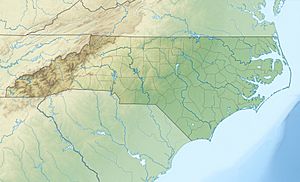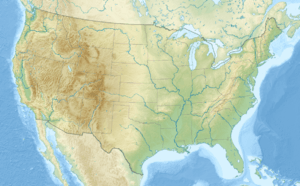Horse Creek (Drowning Creek tributary) facts for kids
Quick facts for kids Horse Creek |
|
|---|---|
|
Location of Horse Creek mouth
|
|
| Other name(s) | Tributary to Drowning Creek |
| Country | United States |
| State | North Carolina |
| County | Moore |
| Village | Pinehurst |
| Physical characteristics | |
| Main source | Joes Fork divide about 0.25 miles southwest of Pinehurst, North Carolina 480 ft (150 m) 35°11′26″N 079°29′07″W / 35.19056°N 79.48528°W |
| River mouth | Drowning Creek about 2 miles southwest of Addor, North Carolina 279 ft (85 m) 35°03′50″N 079°30′25″W / 35.06389°N 79.50694°W |
| Length | 10.08 mi (16.22 km) |
| Basin features | |
| Progression | generally south |
| River system | Lumber River |
| Basin size | 43.51 square miles (112.7 km2) |
| Tributaries |
|
| Waterbodies | Pinehurst Lake |
| Bridges | Burning Tree Road, Diamond Head Drive S, Linden Road, Roseland Road |
Horse Creek is a stream in Moore County, North Carolina. It flows for about 10.08 mi (16.22 km). This creek is a "tributary," which means it's a smaller stream that flows into a larger one. Horse Creek joins a bigger stream called Drowning Creek, which is part of the Lumber River system.
The water in Horse Creek is very clean! It's classified as WS-II and HQW. This means it's considered "High-Quality Water" and is safe for things like swimming and supporting healthy fish and wildlife.
Where Horse Creek Starts and Flows
Horse Creek begins near Pinehurst, North Carolina. It starts in an area called the Joes Fork divide. This is like a high point where water starts to flow downhill.
From its start, Horse Creek travels south. It winds its way through many swampy areas. Finally, it reaches and joins Drowning Creek. This meeting point is about 2 miles southwest of a place called Addor.
Understanding the Horse Creek Watershed
A "watershed" is an area of land where all the water drains into a single river, lake, or stream. The Horse Creek watershed covers about 43.51 square miles (112.7 km2) (112.7 square kilometers).
This area gets a good amount of rain each year, about 49.2 inches. A large part of the watershed, about 37%, is covered by forests. These forests help keep the water clean by filtering out pollutants and slowing down runoff.
 | Leon Lynch |
 | Milton P. Webster |
 | Ferdinand Smith |



